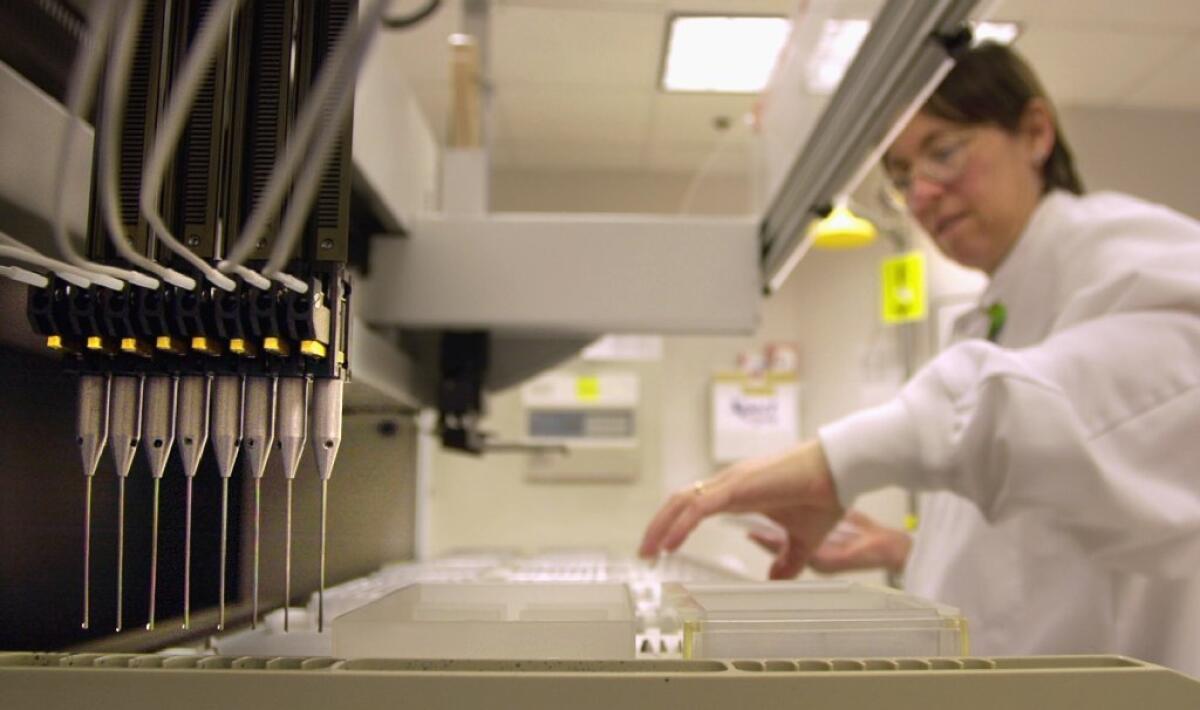More women should consider BRCA test to assess breast cancer risk, new guidelines say

More women may benefit from gene testing for hereditary breast or ovarian cancer, especially if they’ve already survived cancer once, according to new recommendations from experts in preventive medicine.
The guidelines concern genes called BRCA1 and BRCA2. Certain versions of these genes have mutations that hinder the body’s ability to repair damaged DNA. They aren’t common, but when they’re passed through families they greatly increase the chances of breast, ovarian and certain other cancers.
Gene testing allows affected women to consider steps to lower their risk, such as when actress Angelina Jolie underwent a preventive mastectomy several years ago. Some specialists say too few women who could benefit from BRCA testing are getting it.
Most cancer isn’t caused by BRCA mutations — they account for 5% to 10% of breast cancers and 15% of ovarian cancers — so the gene tests aren’t for everyone. But mutations cluster in families, and the U.S. Preventive Services Task Force has long recommended that doctors screen women who have relatives with BRCA-related cancers. Those who might benefit from gene testing should be referred to a genetic counselor to help them decide, the expert panel said.
On Tuesday, the task force published new guidelines that say more women should be considered for screening.
The expanded list includes survivors of breast cancer or other BRCA-related cancers, including ovarian, fallopian tube and peritoneal cancers. It also includes women whose ancestry makes them more likely to inherit higher-risk BRCA mutations, such as Ashkenazi Jews.
The recommendations were published in the Journal of the American Medical Assn. Private insurers follow the task force’s recommendations on what preventive care to cover.
Why screen breast cancer survivors? After all, they already know there’s a risk of recurrence.
Consider a patient who had a tumor removed in one breast in her 40s a decade ago, when genetic testing wasn’t as common. A BRCA test still could reveal if she has an increased risk for ovarian cancer, or faces a higher-than-usual risk for another tumor in their remaining breast tissue, said task force member Dr. Carol Mangione, an internal medicine specialist at UCLA. The test could also alert her daughters or other relatives to a potential shared risk.
“It’s important to test those people now,” Mangione said. “We need to get the word out to primary care doctors to do this assessment and to make the referrals.”
Cancer groups have similar recommendations for BRCA testing, and increasingly urge that newly diagnosed patients be tested too, because the inherited risk can influence choices they make about surgery and other treatment.
Identifying BRCA mutation carriers “can be lifesaving, and should be a part of routine medical care,” Dr. Susan Domchek of the University of Pennsylvania and Dr. Mark Robson of Memorial Sloan Kettering Cancer Center, who weren’t involved in the task force’s work, wrote in an editorial published in JAMA alongside the new guidelines.
But too few high-risk women ever learn if they harbor BRCA mutations, they wrote. For example, cancer groups have long recommended that all ovarian cancer patients be tested, but several studies have found testing is done in fewer than a third of patients.
Don’t skip the genetic counseling, Mangione said. BRCA testing can cause anxiety and sometimes gives confusing results, finding mutations that might not be dangerous.
Genetic counselors are trained to interpret test results, but there’s a shortage of genetic counselors, particularly in rural areas. Counseling conducted by phone can work, Mangione said.
A wide array of gene tests are available, including some that search just for BRCA mutations and others that test dozens of additional genes at the same time. One option is a direct-to-consumer kit sold by 23andMe, but Domchek and Robson warned it only detects the three mutations found most in women of Ashkenazi Jewish descent, not dozens of other mutations.
Neergaard writes for the Associated Press.






